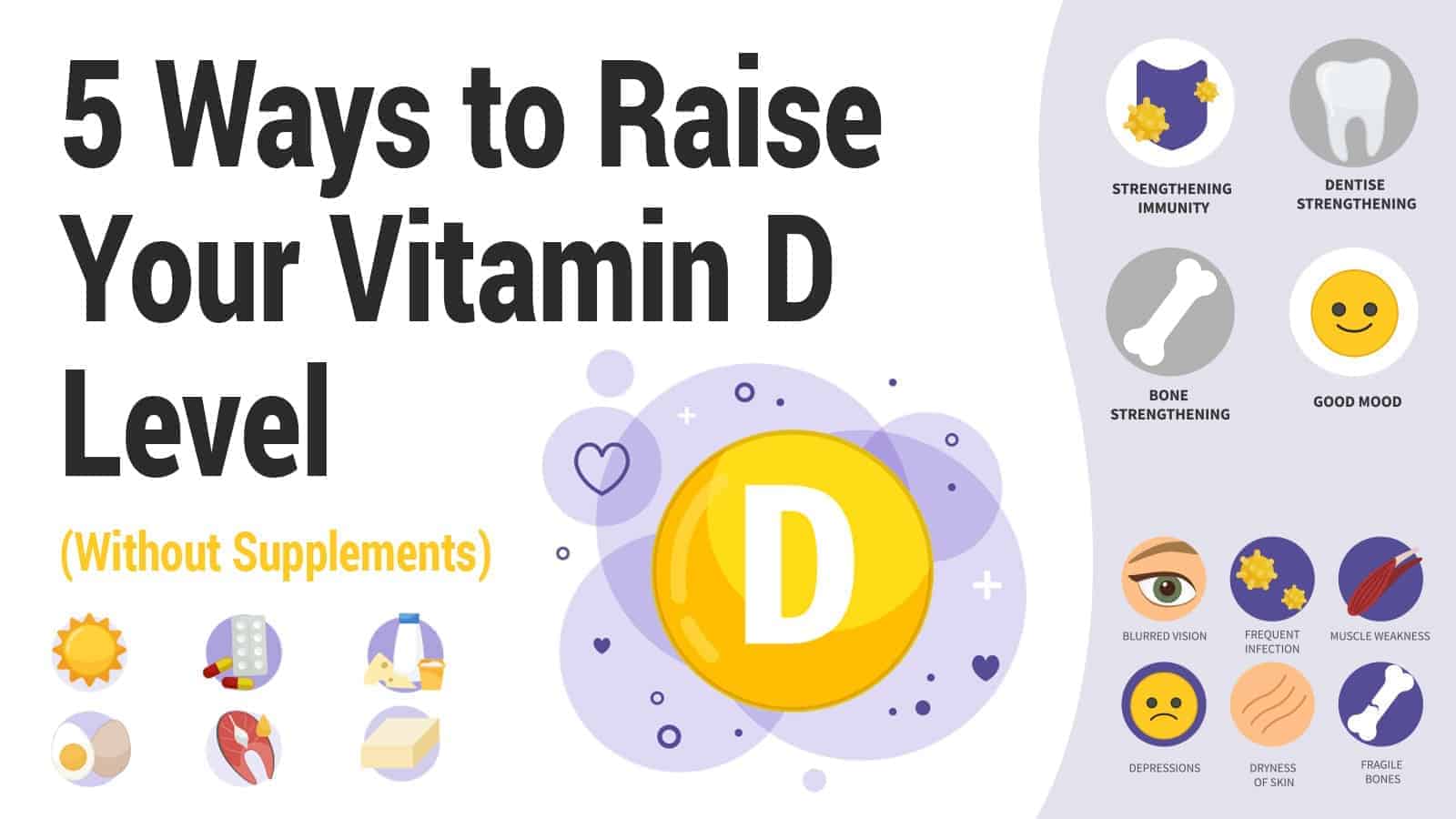While Vitamin D offers a myriad of health benefits, there is still some debate regarding how much of this vitamin our bodies need. Science classifies Vitamin D with a group of fat-soluble secosteroids. Although some people can get an adequate amount of vitamin D from merely being exposed to the sun’s ultraviolet rays, this is certainly not the case for everyone. In particular, those with darker skin or those who live in a region with limited amounts of sunlight are often deficient.
For these cases, it may become necessary to either take supplements or make certain lifestyle changes to achieve the same amount of vitamin D that others receive from the sun alone. In this article, we take a closer look at the health benefits associated with vitamin D. Additionally, we will explore the importance of getting the right amount from sunlight, food, and supplements for optimal health.
HOW DOES VITAMIN D BENEFIT THE BODY?
The primary benefits of vitamin D include enabling the body to absorb calcium and boosting the immune system. Each of these contributes to better overall health. In addition, healthy levels of this essential vitamin provide the following benefits:
- Strengthens bones
- Helping the immune system fight disease and infection
- Supports nerves that transport messages to and from the brain
- Improves muscle strength
HOW DOES CALCIUM IMPROVE BONE HEALTH?
Vitamin D is different from many other vitamins in that the body converts it into calcitriol. That is a hormone that allows bones to efficiently absorb calcium received from other sources like dairy, for example.
SOURCES OF VITAMIN D2 AND D3
Commonly referred to as ergocalciferol (vitamin D2) and cholecalciferol (vitamin D3), vitamin D can be obtained from multiple sources. While sunlight is an excellent source of vitamin D2 and D3, not everyone can benefit from it. This is especially true for those who live in Northern climates like Iceland, for example.
The same applies to individuals with darker skin because the amount of melanin contained in the skin influences how much vitamin D2 and D3 they absorb. According to the CDC (Centers for Disease Control and Prevention), individuals with darker skin are naturally afforded better protection from the sun. However, it will take longer for their body to produce the minimum reference daily intake (RDI) of vitamin D2 and D3 based on FDA standards. To further put this into context, studies show that Mexican-Americans and African-Americans are more likely to have a vitamin D2 and D3 deficiency than their Caucasian-Americans.
MEASURING VITAMIN D2 AND D3
Because race and geographical location are factors in how well the body absorbs vitamins D2 and D3, it can be difficult to gauge just how much each individual needs. The Vitamin D Council, a California-based nonprofit organization, working to educate the public on vitamins D2 and D3, sun exposure, and overall health, provides the following examples to denote how much sun exposure an individual would need to achieve maximum health benefits:
- A darker skinned individual residing in the city of Boston would need to spend a minimum of 2 hours of the summer sun to receive their daily intake of vitamins D2 and D3 per FDA guidelines. Also, one-quarter of their skin would have to be exposed for maximum absorption.
- A medium skinned individual residing in the city of Miami would need to spend a minimum of 6 minutes during the summer to receive their daily intake of vitamins D2 and D3 per FDA guidelines. Similar to darker skinned individuals, one-quarter of their skin would also have to be exposed for maximum absorption.
This example further demonstrates the role that melanin plays when it comes to an individual being able to absorb vitamin D2 and D3 from sunlight. While fair-skinned and medium skinned individuals benefit the most from sun exposure, they should also avoid excessive exposure as ultraviolet rays cause skin damage. After all, the human body is limited when it comes to how much vitamin D2 and D3 it is capable of producing at any one time.
WHAT CONSTITUTES A VITAMIN D2 AND D3 DEFICIENCY?
To determine vitamin D2 and D3 deficiencies, scientist and physicians will measure the level of these vitamins in the blood based on per milliliter measurements. For example, an individual with less than 12 ng/mL of vitamin D2 or D3 in their blood would be considered deficient. That’s because 20 ng/mL and below is too low to support bone health. As such, it would be a good idea to consume foods rich in vitamin D2 and D3 to bring these levels into a normal and healthy range.
Some of these foods include:
- Beef liver
- Tuna
- Mackerel
- Salmon
- Cheese
- Eggs
Of course, this is not a comprehensive list. Moreover, it is a list of foods with the highest concentration of vitamins D2 and D3. Beyond that, these foods also provide additional benefits that can further improve your overall health.
If you’re in the United States, you will be happy to know that many of the foods that you already consume are fortified with these vitamins, so you could, in theory, meet your recommended daily intake of vitamins D2 and D3 without having to make drastic changes to your diet.
DEFICIENCY SYMPTOMS
A vitamin D2 or D3 deficiency can trigger a number of health problems including osteoporosis, which is characterized by fragile bones that are prone to fractures. Furthermore, individuals who are deficient in either of these vitamins may experience bone pain and muscle weakness. It is also worth noting that a vitamin D2 or D3 deficiency in children can lead to rickets, a health condition that causes the bones to become soft and susceptible to bending.
HOW MUCH VITAMIN D2 AND D3 DO YOU NEED?
For individuals with limited exposure to sunlight, the FNB (Food and Nutrition Board) recommends the following International Units daily based on an individual’s age:
- 0 to 12 months – 400 IU
- 1 to 70 years – 600 IU
- 70 and over – 800 IU
However, those individuals with a vitamin D2 or D3 measuring below 30 ng/mL should intake 1,500 to 2,000 IU for optimal health benefits. Also, some individuals require a daily intake of 50,000 IU to restore healthy levels of vitamins D2 and D3. Of course, individuals who are extremely deficient should see a physician before significantly increasing their intake of vitamins D2 and D3.
VITAMINS D2 AND D3 FOR INFANTS
Now that we have a general understanding of vitamins D2 and D3, let’s take a closer look at how these vitamins can benefit infants. If you’re a new mom who is considering breastfeeding your newborn, you should know that your baby will not be able to receive the minimum amount of vitamins D2 and D3 from breast milk alone.
That said, it is a good idea to give your baby vitamin D2 and D3 supplements. These are available as drops at most vitamin shops or in the health and beauty aisle at your local supermarket. Of course, if you opt to feed your baby using one of the many popular formulas currently on the market, supplementation may not be necessary. That’s because these products are usually already fortified with vitamins D2 and D3.
WHAT HAPPENS IF YOU TAKE TOO MUCH VITAMIN D2 OR D3?
While it is impossible to overdose from vitamin D2 and D3 from sun exposure alone, some people do take unnecessarily high doses of vitamin D2 and D3 supplements. In most cases, it is because they believe they are severely deficient in these vitamins. If you share this mindset, it is important that you speak with your physician. He or she can outline a safe and effective treatment plan to help boost your vitamin D2 and D3 levels. High levels of vitamins D2 and D3 in the body can raise calcium levels in the blood, causing heart problems.
High levels of either of these vitamins can also cause the following conditions:
- mental confusion
- vomiting
- nausea
- constipation
- kidney damage
- fatigue
- loss of appetite
- weight loss
- many other health problems.
It is also worth noting that vitamin D2 and D3 supplement can negatively interact with certain prescription-based medication. In some cases, vitamin D2 and D3 supplements can cause prescription-based medications to become either less potent or completely ineffective. As with any supplement, speak with your doctor before taking them.














 Community
Community

